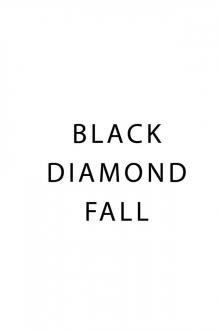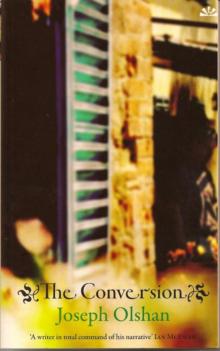- Home
- Joseph Olshan
The Conversion Page 4
The Conversion Read online
Page 4
“Well, of course they will still try to find these men. They must. Otherwise other people could be killed. But now you’ve already given the police a statement, correct?”
I tell her I had.
“So you’ve done your part. And you’re free.” Marina flips her hand in a whimsical manner and smiles at me. “You can return to America, although you’re certainly welcome to stay here at the villa until you’re feeling better.”
I collapse in the cane chair opposite her, keenly feeling the loss of Ed, remembing how, after I had called down to the front desk, a doctor not much older than me arrived at our room barefoot and in silk pajamas. Obviously a hotel guest who had been summoned from his room, the physician had taken one glance at Ed, felt his pulse, and murmured, “He’s gone.” Then he turned to me and asked how I was.
“What difference does that make?” I recall snapping at him.
“Your friend is obviously dead,” he replied with typical French evenhandedness. “There’s unfortunately nothing more I can do for him. But you, you’re still alive.”
Marina, meanwhile, has been looking at me with great concern. “Do you realize that you’ve been sleeping almost continuously for days on end?”
The words no sooner leave her mouth than the urge to crawl back into bed seizes me. I nod and tell her I can’t help it.
“Understood. But you must try to not sleep so much now,” she scolds gently. “Go for walks, take a trip into the city. Walking there takes only a half hour. Make yourself do things. And as I said, stay here for as long as you like.”
“You’ve been very kind to me.”
“Who wouldn’t be kind? Perhaps I have some reason to be kind,” she says mildly with a smile.
“Oh?”
“We’ll discuss it on our stroll.”
It occurs to me that Marina seems far too sophisticated to entertain the idea of perhaps having an affair with a younger man clearly wired toward members of his own sex, not to mention the fact that I am dealing with the emotional fallout over Ed’s death. But neither does she seem particularly maternal. Besides, hadn’t she just introduced me to her sister-in-law? “I had no idea you were married,” I say in English.
She laughs and responds, “We didn’t discuss it,” gazing at me with disarming directness. “You sound disappointed. As though you were hoping to court me.”
“‘Court you’ is a very antiquated phrase.”
Marina ignores my comment and returns to Italian. “Anyway, I am married, but not to her brother.”
“You divorced him?”
“Not exactly. We were already separated when he—her brother—died very unfortunately. In an automobile accident.”
I murmur that this must’ve been very tough and she solemnly nods her head in agreement. “Yes, it was. Terribly. And now I am married for the third time,” she admits quietly.
I stare at her, fascinated. “So then where’s your husband?”
It’s her turn to look surprised. “What do you mean, where is my husband? He’s here at the villa.”
Feeling awkward, I say, “Why haven’t I met him?”
“Well, you’ve been asleep.”
“But shouldn’t I?”
“I suppose you should. But actually he’s a recluse. He stays in his room mostly. My Carla brings him all his meals. Have you noticed all those books in your room?” she asks. “In fact, the room used to belong to Stefano. But when I began renting the villa out for weddings, he moved to the part of the house that would be the farthest away from all the public activity. He mostly just stays put, reads and writes his articles. At night sometimes, if you stand in the middle of the salone, you can hear the pitter-patter of his old typewriter, the one he’s always used, dating back to his days as the chief cultural critic with the Corriere.
“Anyway,” she goes on, “you have two phone calls. One is from that very aggressive Annie Calhoun.”
“Did you actually meet her in Paris?” I ask.
“We introduced ourselves at the hotel.”
“She’s Ed’s literary executrix,” I explain.
“I figured as much. She called—it was a few days ago—and was asking about a certain manuscript of your late friend.”
I groan and then inquire about the other call.
A puzzled yet somehow amused look shades Marina’s face. “A Madame Michel Soyer.”
I involuntarily pitch forward in my chair, my head reeling.
“What’s wrong?” she asks.
I explain that she’s married to Michel, my ex whom I haven’t seen in over a year. Why on earth would she be contacting me? “How could she have found me here?”
“With ease, my friend, with such incredible ease, you have no idea. As one would guess, the death of the decorated American poet has been reported. And you, as his companion, are mentioned, obviously.” She begins counting with her fingers “It was in Le Monde, here in La Stampa, Corriere della Sera, Il Gazzettino, and even in our local paper, Il Tirreno, where they reprinted … I guess it was the last poem that he ever published.”
“‘Venice Sinking by Degrees’?” I ask.
“Yes, the very one. It’s really quite graceful, even in translation. It gives a very unusual glimpse of a city that has been written to death. I must say, the images of decay are remarkable. Down to the descriptions of the algae in the water and the barnacles on the boatslips.”
The poem had actually been written about a trip that we took, Ed and I, when we stayed in the Palazzo Albrizzi, a private residence owned by a Venetian nobleman. Besides the barnacles and the algae, Ed melodiously describes the enormous hanging glass lanterns in the palazzo’s entryway. The poem seems to be about the dying of energy and ardor but it’s actually—he admitted as much—about the fact that I’d been unable to return his aroused affections in such a romantic setting.
“Anyway,” Marina goes on, “this woman who called you here surely saw the articles and rang up the hotel. And probably made the concierge think she knew you well enough to get information.”
Another wave of fatigue, the urge to recoil from Ed’s dying and these people trying to contact me who clearly want something. I suppose my eyelids begin fluttering because Marina barks at me, “Don’t fall asleep again! I’ll make you a coffee. For God’s sake, you need to do things. Get your mind off of this. I know, go make your phone calls. The names and numbers are written down in the kitchen. Then get on some proper shoes and we’ll go for our walk.”
One of the dogs understands the word passeggiata, and the frenzied barking begins again. Marina silences them, amused.
She gets up and leaves the loggia, whose stone balustrades are so old they seem to be crumbling or dissolving. To the left of me, over a walled Tuscan city just a few kilometers away, rise the blue peaks of the Apuan Alps.
Reluctant to get into a conversation with Ed’s overly zealous executrix, I linger on the loggia. I gaze up thirty-five feet at high arches, frescoed with trompe l’oeil to look more architecturally ornate and gilded, and then toward the far wall. Here are beautifully executed though slightly pockmarked frescoes of a pastoral scene: sheep and their shepherds, a snaking river, the unmistakable gold-and-olive-colored Tuscan hills, tall cypress spires.
There is a blue slip of paper next to the kitchen telephone with Marina’s scrawl:
For Russell:
1. Annie Calhoun 001 212 777 4145
2. Madame Soyer 0033 42 71 65 86
Suddenly fearing bad news about Michel, I decide to call Madame Soyer first.
To my great disappointment I get an answering machine with a bilingual message in French and English. I hang up, and as I am standing there contemplating my next move, Marina’s housekeeper, Carla, comes into the kitchen. A stout woman of late middle age with dark copper hair and a practically lineless face, Carla has been kind enough to bring me a few meals in my room: carbonara that she claims is made from the eggs produced by her chickens; pasta complemented by the villa’s fresh tomatoes and mint;
plates of prosciutto; wedges of Tuscan pecorino with clusters of Sicilian grapes.
Carla speaks a blurred, truncated Tuscan dialect that is a challenge for me to understand. However, a few days ago I overheard her telling a workman, “No, no, you can’t go in there now. He’s sleeping. Sleeps all the time. Like a crazy.” An insult perhaps, but somehow this struck me as uproariously funny and I started to laugh, so much so that Carla opened the door and said, “What, what is it? What is so amusing, so suddenly?”
“I’m not a crazy,” I said, still chuckling.
“God in heaven forgive me,” she’d replied. And then commanded me to go and stroll the garden. “Would be the cure of you,” she’d said gruffly. At the time I didn’t listen to her.
Now she greets me brusquely and, putting her stout muscle behind it, begins wiping down a lazy Susan built in the middle of a round highly varnished wooden kitchen table. To me a lazy Susan is a very middle-American convenience, and I wonder what such a suburban contraption is doing in a fifteenth-century Tuscan villa. On the counter a slab of prosciutto nestles in a delicatessen meat slicer. Eyeing it, Carla asks if I’d like some. When I politely decline she mutters something unintelligible to herself and begins to mop the terrazzo floor. She merely pretends to be disgruntled and disagreeable; I will soon learn she is completely devoted to Marina, and even more devoted to Marina’s mysteriously reclusive husband.
Annie Calhoun, the literary executrix, picks up after the first ring and actually hesitates before agreeing to have the charges reversed to her. She claims to have gone to the New York University–subsidized apartment where Ed had sent all of his belongings, has successfully found all the writing files in his computer, sorted through his papers, which are all relatively well organized, but has not yet located the manuscript of “the memoir,” which she’d unsuccessfully searched for among all the papers he’d had with him in the Parisian hotel.
Annie Calhoun had known Ed for more than thirty years. An essayist of sorts, very early in her career she landed a tenured job at a small New England college; according to Ed, she went on to publish very little, virtually nothing during the last two decades. Annie is the sort of person who would think nothing of badgering the Cathedral of Saint John the Divine into postponing an afternoon concert in order to book Ed’s funeral, something she boasted about having done when we first met after he had died. I just happen to know that Ed had seriously considered transferring the responsibility of his estate to somebody whom he felt was more emotionally stable, somebody less petty and volatile than Annie Calhoun. But I guess now that’s a moot point.
During our first meeting at the hotel, I’d tried to explain that the French authorities had ordered me back to Paris in ten days’ time to be a respondent in a formal inquest. I told Annie I had very little money in reserve, certainly not enough to stay on in France for another ten days. My only choice would be to use the one-way ticket that I’d bought to go home to America and then borrow money to return to France when it was necessary.
“So why do I have to be concerned with this?” Annie had asked in a voice hoarse from traveling all night and from smoking unfiltered cigarettes.
Hesitating a moment, I said, “If I had any resources at all I wouldn’t even bring it up.”
“So then you’re asking me for the money?”
“I was actually hoping … well, that the estate might help pay, being that Ed is at the center of all this.”
Annie is a tall, long-limbed woman with shoulder-length iron-gray hair and a shrewd, sculpted face whose smile pulls her lips up asymmetrically to the left. That day she was dressed in thin charcoal-gray slacks and a black cotton V-neck shirt that revealed a throat covered with liver spots. “I’ll look into it, Russell, okay? In the meantime, I have a lot to deal with here.”
So summarily brushed off, I found myself remembering all of Ed’s complaints about Annie, including that she leaned on him far too much while expecting him to do the same. There, in the hotel lobby, I’d noticed that we were attracting attention from the traumatized staff, who, instead of accepting the idea that riffraff could so easily infiltrate their establishment, had already convinced themselves that we’d hired a street hustler and that Ed had died perhaps after pulling an all-nighter of recreational sex. In light of these assumptions they were making it quite clear that they were eager for me to depart.
Now, standing in Marina’s kitchen, hoping to stave off a conversation about Ed’s memoir, I ask Annie if she’s managed to locate copies of the last sequence of poems that he’d been working on.
“The ones about the Palazzo Barbaro?” she asks, referring to the famous residence in Venice that had attracted a cluster of well-known American poets during the sixties and seventies, Ed among them.
“Yes.”
“As I said, I have everything except ‘the manuscript.’ There is where I believe you come in,” she says pointedly.
Obviously, the discussion can no longer be stalled.
As he had explained when we first met up at the Left Bank café, for the last ten years Ed had been struggling with his memoir, which ran some three hundred pages. Many of his friends—Annie in particular—had kindly offered to read it and give suggestions and, hopefully, encouragement. But Ed kept his own counsel. He tortured himself with the idea that it was an irremediable failure. In the year I spent with him I’d noticed that he seemed to agonize a lot less over his poems, which he either massaged and filigreed to a state of impeccability, or simply destroyed before they saw the light of day—all in all, a very cut-and-dried attitude. And yet I thought that some of his throwaway efforts were perfectly good attempts that would have been gratefully published by any number of top-tier magazines. He was a self-flagellating perfectionist of a poet who understandably had much more difficulty writing straight, narrative prose.
As it happens, I’m familiar with a good swatch of the manuscript—according to Ed, besides himself, the only person in the world who is. At his wit’s end one afternoon, he’d asked if he might read a section aloud to me. He told me that he was willing to take this leap of faith because I’d managed to publish a novella. When Ed read to me for the first time I offered both genuine encouragement and, according to him, provocative suggestions. Soon he began showing me what he felt were some of the manuscript’s more problematic sections. And I agreed with him, they were problematic: they were long-winded, meandering accounts of where he’d been when he’d written certain poems, as well as pages upon pages of descriptive writing that neither told a story nor illuminated any persons or events—in short, thousands of words of lapidary travelogue. There were also long, somewhat embarrassing rants on his loneliness, his inability to remain in a relationship for more than a few years. My ongoing advice to him was simply to streamline the memoir as much as possible.
Finally, after having won his trust the hard way, I’d only recently begun working with him on what I felt was the most promising and powerful ninety-page section of the book with the idea of his publishing it either as an excerpt or disguising the characters and some of the events and bringing it out as a novella. Ed actually approved of my edits but made me swear to absolute secrecy about our collaboration. And although he would have been loath to admit it, this surreptitious engagement had become the central pillar of our relationship.
I now tell Annie, “If the manuscript isn’t at NYU, I have no idea where a copy could be. Have you checked the mail in the Berkshires?” Ed had planned to spend the last few weeks of the summer at the house he rented every year in Massachusetts.
Annie claims to have already contacted the post office there. They’d found nothing. But now comes a salvo that she clearly has been waiting to deliver. “I found a yellow Post-It in the trunk full of his papers that says in his handwriting … Here, let me read it to you directly: ‘The manuscript is in Russell’s computer.’”
Busted, yes, but not in the way she thinks. Before I came over to Paris for the apartment swap I’d bought a new laptop and was usi
ng my old laptop case to carry books and papers. Several months ago Ed had asked to borrow this older case to carry around the typescript of his manuscript, which he’d written partly in longhand and partly on a typewriter. He’d jocosely taken to calling the contents of the carrying case “Russell’s computer.” He distrusted computers and used them only to store the final versions of his poems for the purpose of printing copies to send along to various magazines and publishers. My response to Annie manages to be the actual truth, although it conceals a lie. “That was his plan all along. To input the entire manuscript on my laptop. But he never got around to it.”
“Why don’t I believe this?” she says after a short pause.
“You don’t trust me. But then again why should you?” I hazard to say.
Just then a ringing phone startles me and I realize I’m standing next to a very compact-looking fax machine that begins to groan electronically as it prints out a thermal curl of paper. I can’t help but read the communication, a wedding confirmation. I resume, “Let me ask you this. When you do finally locate the manuscript, are you planning to publish it?”
“That’s hard to know. I have to see what form it’s in.”
“Even though you know he wasn’t ready to bring it out?”
“I know that he certainly complained about it a lot.”
I remind Annie that Ed had plainly told both her—and me—that he would never publish his memoir until he got it absolutely right, that he was greatly dissatisfied with it at the time of his death.
“Certainly. But then there are the critics and the scholars and the students of his work, not to mention his readers to consider.”
I hear somebody coming into the kitchen and turn to see Marina carrying two empty wineglasses, which she places quietly in the sink. I hold up a finger and make a lugubrious face. “La strega letteraria,” I whisper in Italian. “The literary witch.” Marina rolls her eyes and leaves.
Annie resumes, “Russell, I will ask you once again if you’ve found any part of this manuscript.”

 Black Diamond Fall
Black Diamond Fall Cloudland
Cloudland Nightswimmer
Nightswimmer The Conversion
The Conversion